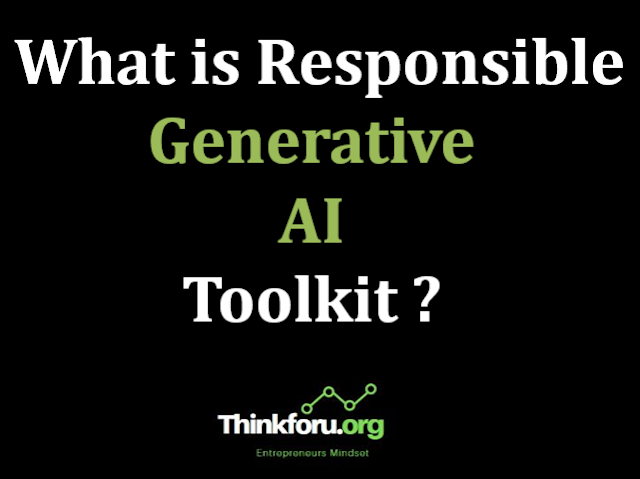What is Responsible Generative AI Toolkit ?
What is the Responsible Generative AI Toolkit?
The Responsible Generative AI Toolkit is a collection of resources designed to help developers and users build and work with generative AI models in a safe, ethical, and responsible way. It's particularly focused on models like Google's Gemma, but the principles generally apply to other generative AI as well.
Holistic approach: The toolkit emphasizes the importance of considering all aspects of responsible AI, including both the application level (how the model is used) and the model level (the model itself and its capabilities).
Additional resources: While primarily focused on Gemma, the toolkit also references other relevant resources and best practices in the field of responsible AI.
1. Ethical Considerations:Responsible AI development involves considering the ethical implications of AI systems. This includes issues related to bias, fairness, and potential societal impact. Developers should strive to create models that treat all individuals fairly and avoid perpetuating existing biases.
2. Transparency:Making AI systems transparent and understandable is crucial. Users and stakeholders should be able to understand how the AI system works and make informed decisions about its use. This involves providing clear documentation and explanations of the model architecture and decision-making processes.
3. Explainability:Generative AI models, especially complex ones like deep neural networks, can be challenging to interpret. Efforts should be made to make the decision-making process of the model more interpretable, enabling users to understand why a certain output was generated.
4. User Privacy:Generative models often deal with sensitive data, and respecting user privacy is paramount. Responsible AI toolkits should provide mechanisms to ensure that user data is handled securely and in compliance with relevant privacy regulations.
5. Robustness and Security:AI models should be designed to be robust against adversarial attacks and other potential security threats. Ensuring the security of AI systems is part of responsible AI development.
6. Accountability:Developers should be accountable for the performance and impact of their AI models. This involves regular evaluation, monitoring, and updating of models to ensure they continue to meet ethical and performance standards.
A "Responsible Generative AI Toolkit," can provide additional considerations and practices related to responsible AI development, especially in the context of generative models:
7. Inclusivity and Diversity:Ensure that the training data used for generative models is diverse and representative of the population it will interact with. This helps mitigate biases and ensures that the model is inclusive across different demographics.
8. Human-in-the-Loop (HITL) Systems:Implementing systems where humans are involved in the decision-making loop can enhance the overall responsibility of AI applications. Human oversight can help catch errors, biases, or situations that the model might not handle well.
9. Continual Monitoring and Updating:Regularly monitor the performance of generative models in real-world scenarios and be prepared to update the models as needed. This helps address any emerging issues and ensures that the models remain relevant and effective over time.
10. Public Engagement and Feedback:Encourage public engagement and feedback regarding AI applications, especially those with societal impact. Seeking input from a diverse range of stakeholders can provide valuable perspectives and help shape responsible AI practices.
11. Legal and Ethical Compliance:Ensure that AI models comply with relevant laws and ethical standards. Stay updated on legal and ethical guidelines in the regions where the AI system is deployed.
12. Educational Initiatives:Promote understanding and awareness of AI technologies among users, developers, and other stakeholders. This can help create a more informed society that can critically assess and engage with AI applications.
13. Open Source and Collaboration:Consider open-sourcing parts of the AI toolkit or collaborating with the broader community. This can facilitate collective efforts to improve responsible AI practices and share best practices.
To find specific toolkits or frameworks that address responsible AI in the context of generative models, you may want to check the latest research papers, community forums, or official websites of organizations working on AI ethics and responsible AI development.
Resources for learning :Responsible Generative AI Toolkit: https://cloud.google.com/explainable-ai
Fundamentals of Responsible Generative AI (Microsoft): https://learn.microsoft.com/en-us/training/modules/responsible-generative-ai
Responsible AI Tools and Practices (Microsoft): https://www.microsoft.com/en-us/ai/tools-practices
More Related to Generative AI
What is Generative AI Google
What is Generative AI vs Discriminative AI
